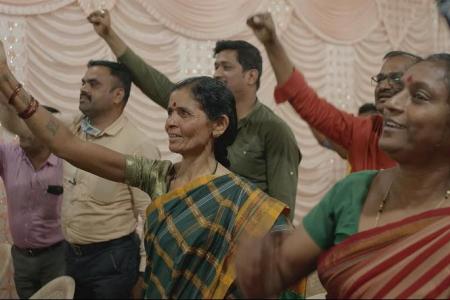Indian, South Korean films win key prize at Busan Film Festival
SEOUL - An Indian movie about an impoverished woman involved in a pyramid scheme has won the key prize at this year’s Busan International Film Festival (BIFF), the organisers announced.
A total of 10 movies, including Singaporean-South Korean co-production Ajoomma, were in the running for the high-profile New Currents award at Asia’s largest festival, with two winners selected for the US$30,000 (S$42,800) prize.
The other recipient of the prestigious award – reserved for first or second-time Asian directors – was a South Korean film about a young carpenter who encounters a series of seemingly trivial but strange events.
Indian film Shivamma, in the Kannada language, is director Jaishankar Aryar’s feature debut and was lauded by the festival’s judges.
“We praise the director, who completed this story that fits our current era, for his originality and intensity,” the judges said in a statement.
The other winner, A Wild Roomer, is South Korean filmmaker Lee Jeong-hong’s first feature film.
It bagged two other prizes at BIFF, including the Network for the Promotion of Asia Pacific Cinema award and the KBS Independent film award.
A Wild Roomer uses “innovative filming techniques” to showcase its characters, who appear to spend a lot of time in a house together, the judges said.
Festival director Huh Moon-young said its goal was to nurture regional filmmakers, not just homegrown talent.
“Supporting Asian filmmakers and rooting for them is the real responsibility of the Busan Film Festival,” he said.
To that end, the New Currents prize selection features a diverse selection of the region’s up-and-coming talents.
Ajoomma, an upbeat film about a Singaporean widow who visits South Korea, has been a hit with festival-goers, and is also Singapore’s entry for the 2023 Oscars.
Director He Shuming said it was inspired by his own mother’s obsession with South Korean soap operas, and her efforts to forge a new identity for herself once her children had grown up.
“Like many Singaporean adults, I still live with my parents. I was observing her aging, and how she’s also embarking on a chapter of her life, as much as I am,” he said.

When his mother returned from her first trip to South Korea, “she changed all our utensils at home to Korean ones. So that obsession then amused me”, He told AFP.
Women of his mother’s generation have spent their lives being mothers “and when their kids find their way out of the nests, they usually expect the next step is being a grandmother”.
The film asks: “What if that doesn’t happen? And can they forge an identity beyond being a mother?”
The title Ajoomma is a Korean term for middle-aged women or housewives, which means something equivalent to “auntie”.
Other films in the section include South Korean director Lim Oh-jeong’s Hail To Hell, Japanese director Nao Kubota’s Thousand And One Nights and Thai filmmaker Thapanee Loosuwan’s Blue Again.
BIFF returned at full force this year after South Korea lifted its pandemic restrictions, featuring 242 films from 71 countries, including 88 world premieres.
A total of 161,145 people visited the festival, organisers said, with hundreds of overseas guests and thousands of South Korean industry figures in attendance. - AFP
Get The New Paper on your phone with the free TNP app. Download from the Apple App Store or Google Play Store now


